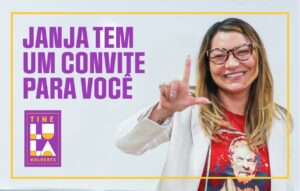Responsible for coordinating the agenda of Luiz Inácio Lula da Silva, Clara Ant was a senior adviser to the former president and has run the Africa Initiative for the Lula Institute since last August. The institution is charged with maintaining the former head of state’s historical archives and an international exchange of policy experience. Assisting in the exchange of experiences in the social arena and supporting the promulgation of successful programs in Brazil to eradicate hunger and poverty are among the institute’s principal objectives.
This interview by João Belisário was originally published by Africa 21 Magazine.
AFRICA 21. Why has the Instituto Lula begun to be concerned about Africa?
CLARA ANT: Since the start of his first term, former President Luiz Inácio Lula da Silva has placed a high priority on the relationship with African countries in a variety of areas. In addition to having this relationship be a part of a general South-South relations intensification policy and diversifying Brazil’s trading partners, special attention has been given to African nations, with increased focus on our diplomatic relations and cooperative activities. By the end of his second term, Lula had made ??33 trips to the African continent and visited 23 countries. Nineteen new Brazilian embassies were opened in African nations. Examples of cooperation between Brazil and African countries include building an anti-retrovirals plant in Mozambique, a partnership with FIOCRUZ, and Embrapa initiatives in several nations. The guiding principle is to cooperate in a way that lets Africans themselves have the means to guide their own development. On the same day that he handed over the Presidential Sash to President Dilma Rousseff, Lula declared that he would devote himself to strengthening the relationship between Brazil and Africa’s countries and peoples. Thus, the Africa Initiative, established in August of last year, has become one of the areas to which the Lula Institute has been dedicated.
What are the goals of the Lula Institute’s Africa Initiative?
There are four main objectives: 1) to facilitate the exchange of experiences in the social arena by supporting the dissemination of information about successful Brazilian programs to combat hunger and poverty, 2) to encourage trade and productive relationships with Brazilian companies that operate or intend to operate in Africa, 3) to support initiatives in the struggle for peace, democracy and international solidarity, and 4) to encourage cultural events that highlight our identification with the peoples of Africa.
What actions have been taken to date by the Institute in relation to the African continent?
There have been several initiatives of different types. To mention a few, we supported two important forums to discuss commercial relations – one in São Paulo, another in Rio de Janeiro – in conjunction with FIESP [Federation of Industries of the State of São Paulo] and BNDES [Brazilian Development Bank]. Both events featured the participation of a significant number of African leaders, ambassadors, businessmen and scholars, as well as Brazilian authorities. We participated as observers in the last three African Union summits – two in Addis Ababa [Ethiopia], one in Malabo [Equatorial Guinea] – at which President Lula was a special guest. We held dozens of meetings with ambassadors and African authorities, representatives of international NGOs working in Africa, Brazilian researchers, multilateral organizations, businesspersons, representatives of Brazilian governmental agencies, and groups of Brazilians who are active in cultural activities and cooperation in the social arena. We have created a network of collaborators, particularly specialists who have studied developments in Africa for a long time and who can help by providing us with a theoretical framework.
What are your more immediate and long-term plans?
At the moment we are working mainly in support of an important event being organized by the FAO [UN Food and Agriculture Organization]. There will be a meeting of African leaders and international authorities to discuss, coordinate, and consolidate activities to fight hunger and poverty in Africa, scheduled to take place in 2013 in Accra, Ghana. The intention is that its participants will include principal leaders of the African Union, heads of state, leaders of major NGOs working on the continent, Brazilian authorities, and entrepreneurs. We believe that Brazil can be of considerable help in this regard because our social programs have had great success here, especially those related to agriculture, which is an area that is crucial to the development of the African continent. I believe that much of what was done here can serve as a reference, with each country working in its own way to overcome hunger and poverty that afflicts a good part of the population that lives there.
Who are the Lula Institute’s main partners – in Brazil and Africa – governments, NGOs, international institutions, companies?
First of all, we must say that we work closely with the Brazilian government and we do not do anything that might create any kind of conflict with the policies of President Dilma Rousseff or the ministries, in particular the Foreign Ministry, the MDS, the MDA, the MAP [respectively, the Ministries of Social Development, Agricultural Development, and Agriculture, Livestock and Supply], among others. We have comprehensive discussions about joint activities with various domestic and international institutions that are working in a variety of areas with the embassies of African countries in Brasília; multilateral organizations, such as the FAO, UNDP [UN Development Program], and the World Bank; and with the companies that are already doing or intend to do business in Africa. We believe we can serve as a support base for the coordination and enhancement of the initiatives of many institutions that work in Africa, but operate independently from one other.
What kind of special attention by the institute do the Portuguese-speaking African countries deserve?
Of course, a common language is a great facilitator. We closely monitor all initiatives of the CPLP [Community of Portuguese Language Countries] and President Lula has just received a beautiful tribute from the community. It was during his administration that Brazil created, in Ceará, the UNILAB, the University for the International Integration of Afro-Brazilian Lusophones. It is in these countries where some of the major projects of Brazilian companies in Africa are taking place. It is also with those nations that our cultural ties can be seen more clearly, facilitating greater exchange, more cooperative activities in the social arena and where the presence of other Brazilian companies is greater.
Many African countries have an interest in knowing more about programs to combat hunger and poverty that were initiated by President Lula’s administration and many have already announced [the intention to implement] similar measures. Up to what point can the Brazilian model be applied in Africa?
I think we should not talk about a “Brazilian model.” We believe that the social programs that work in Brazil are those that are appropriate to the local environment, to our history, to the specificities of Brazilian society. Many delegations from African countries have indicated their interest in these programs. What is important is that these governments and civil society organizations take the experiences that are useful for them, adapting and improving them to meet their local challenges. In Angola, for example, President Eduardo dos Santos proposes his “National Program for Minimum Income,” inspired by our “Bolsa Familia.”
In addition to fighting hunger, what other activities does the institute plan to develop along with its African partners?
We have been through a structuring process and the institute is only a year old. Beyond this, it was during this period that President Lula had to take time out for an intensive battle against cancer. Much of our time is still being spent acquiring knowledge and building relationships with people and institutions that have already been operating in Africa for some time. We realize that the current environment for the growth of Brazil’s relations with Africa, in all regards – economic, social, cultural, and diplomatic – is exceptional. Never before in history have Brazil and Africa experienced simultaneous processes of economic development. Today, Brazil is the sixth largest economy in the world; Africa, growing at 5-6% per year since 2001, should continue to grow. There are enormous business opportunities in Africa for companies from rich and emerging nations. This year, the African Union approved its “Program for Infrastructure Development” (PIDA), which seeks to create conditions to integrate the continent in vital areas, such as energy and transportation. I think we can be of help in establishing partnerships between African governments and Brazilian entrepreneurs. We can also encourage cooperation agreements that help African nations in achieving self-sufficiency in food, democracy, and peace, as well as [establishing] greater social justice.
CLARA ANT
Clara Ant, 64, has an undergraduate degree in Architecture from the University of São Paulo (USP), and was a professor of Urban Planning at the College of Architecture and Urban Studies at the Pontifical Catholic University (PUC) – Campinas, as well as the director of the Union of Architects of São Paulo and the National Federation of Architects. She was a founder and one of the first women leaders of the Central Union of Workers (CUT). She was a State Representative and leader of the Workers Party (PT) in the São Paulo Constituent Assembly (Constituente Paulista) in 1987-88, a member of the National Executive Committee of the PT from 1995-2001, and treasurer of the party’s presidential campaign of 1998. She participated in the Citizenship Caravan and the development of public policy projects at the Citizenship Institute, as well as policy planks for the presidential campaigns of President Lula. As Regional Administrator for the City of São Paulo, in 2001-02, she coordinated the downtown São Paulo Rebuilding Plan. In late 2002, she joined the Transition Team of President-elect Lula and, between January 2003 and April 2010, was an adviser to the president. In the Office of the President, she coordinated the preparation of information and monitoring of decisions made. In this capacity, she had technical visits at the White House in 2005 and with the French government in 2007. In Africa, she accompanied President Lula to Senegal, Guinea, Equatorial Guinea, and Ethiopia. She participated in the coordination of the Worker Party’s 2010 presidential campaign and was a member of President-elect Dilma Rousseff’s transition staff.



